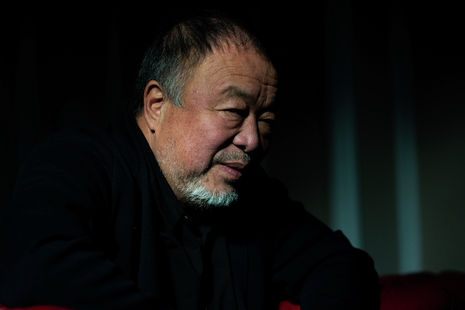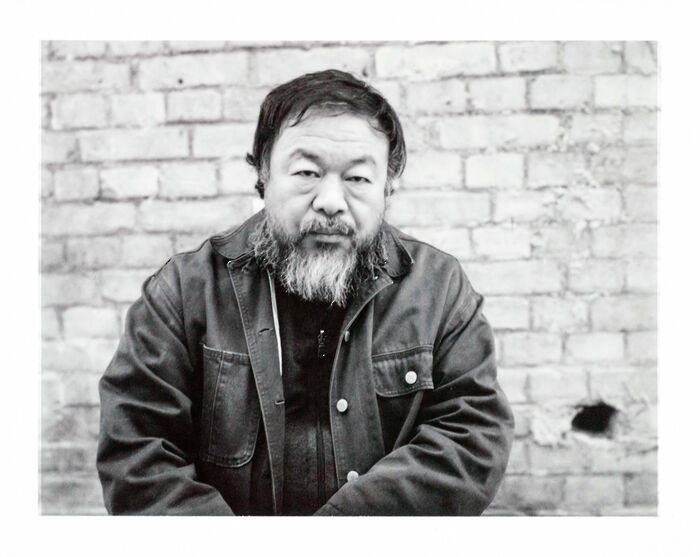How different is the West from China? Ai Weiwei in Cambridge
The artist introduces Marion Willingham to his Kettle’s Yard exhibition, Liberty of Doubt

Ai Weiwei is one of the best known and most prolific artists of our time. Addressing a crowded Cambridge Union on Thursday 17th February, he discussed his 81 day detention in China, his controversial decision to drop a Han Dynasty urn, and his newest film project Coronation, filmed in Wuhan by dozens of remotely directed volunteers. He then sat down with Varsity to discuss his latest exhibition, Liberty of Doubt. “That title is pretty vague,” Ai says, “but it is really related to history, how we make judgements and how we evaluate. For me, any meaningful thoughts come from doubt. I think doubt is crucial.”
“Politically also,” he says, “when a society starts to believe that one idea is right and that the others are bullshit, I think that is very dangerous, and can go to extremes. We have a potential danger when people think: ‘This is obviously right.’ I will always have doubts about it.” Ai is known not only as a political sceptic but as a dissident, for his continual criticism of the Chinese government. There is a sense in Liberty of Doubt, however, that his political statements are no longer reserved for China. Takeaway boxes and toilet rolls carved in marble are exhibited in display cases from the British Museum, whilst porcelain plates depict the global refugee crisis.
“Any meaningful thoughts come from doubt”
“China is an authoritarian state, which is easy to associate with strong censorship, clear doctrines, and not allowing individual opinions to be presented. But, the West still does this in a different way: through education, mainstream media, entertainment. They also discourage individualism through financial means; you cannot achieve financial success if you don’t talk with the same language, the same tone, the same set of judgements. So in very different ways, they achieve the same result, in terms of limiting human imaginations and creativity.”
Despite his ardent defence of freedom of speech, Ai is keen to emphasise the subjectivity of any supposed “truth”. The first room of his exhibition is filled with historic Chinese objects, bought at auction in Cambridge – some of which are authentic whilst others have been identified as counterfeits. He states that the notion of authenticity is much more important in Western culture than in China, where copying is seen as an important and legitimate cultural process. “When we talk about truth we talk about our inner judgement, on aesthetic and moral levels, that is truth. Truth is not fact. It’s relative, based on our own vision and our own language.”
When asked about the precarity of truth in the social media age, Ai does not seem worried, historically an active social media user himself. “We can see social media as an environment – it’s just like a mountain or river, raining or snowing. Of course, life as a journey passes through environments where everybody has a very different perception or different understanding of life.”
“Truth is not fact. It’s relative, based on our own vision and our own language”
Alongside the objects on display at Kettle’s Yard – both artistic and historic – various documentary films are being screened, including the 2017 feature Human Flow. Ai’s films, books, and political projects such as the collection of thousands of names of school children killed in the 2008 Sichuan earthquake, require a process which is more investigative than artistic. “My studio,” Ai says, “is more about researching, archiving, studying what we have done and how we did it. In my studio you cannot see a single artwork of mine, which is different from any other artist’s which is full of their works. I hate looking at my works.”
As for what could emerge from his studio in future, Ai plays his cards close to his chest. “I have no plan,” he says. “I don’t have to do art. It happens that I am still doing art, but I don’t have plans.” In the meantime, Liberty of Doubt is on display at Kettle’s Yard until 19 June.
 Features / Should I stay or should I go? Cambridge students and alumni reflect on how their memories stay with them15 December 2025
Features / Should I stay or should I go? Cambridge students and alumni reflect on how their memories stay with them15 December 2025 News / Dons warn PM about Vet School closure16 December 2025
News / Dons warn PM about Vet School closure16 December 2025 News / Cambridge study finds students learn better with notes than AI13 December 2025
News / Cambridge study finds students learn better with notes than AI13 December 2025 News / SU reluctantly registers controversial women’s soc18 December 2025
News / SU reluctantly registers controversial women’s soc18 December 2025 News / News In Brief: Michaelmas marriages, monogamous mammals, and messaging manipulation15 December 2025
News / News In Brief: Michaelmas marriages, monogamous mammals, and messaging manipulation15 December 2025









